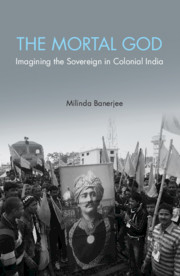Book contents
- Frontmatter
- Dedication
- Contents
- Acknowledgements
- Note on Transliteration
- Abbreviations
- Note on Documents Used
- Introduction
- 1 ‘Caesar of India’: Debating the British Monarchy and Colonial Rulership
- 2 ‘State is the Household Vastly Enlarged’: Imagining Sovereignty through the Princely States
- 3 ‘One Law, One Nation, One Throne’: Debating National Unity
- 4 ‘One has to Rule Oneself’: Collectivising Sovereignty in Peasant Politics
- 5 ‘God's Kingdom Has Come’: Messianic Sovereignty in Late Colonial India
- Conclusions and Further Thoughts
- Index
2 - ‘State is the Household Vastly Enlarged’: Imagining Sovereignty through the Princely States
Published online by Cambridge University Press: 13 September 2018
- Frontmatter
- Dedication
- Contents
- Acknowledgements
- Note on Transliteration
- Abbreviations
- Note on Documents Used
- Introduction
- 1 ‘Caesar of India’: Debating the British Monarchy and Colonial Rulership
- 2 ‘State is the Household Vastly Enlarged’: Imagining Sovereignty through the Princely States
- 3 ‘One Law, One Nation, One Throne’: Debating National Unity
- 4 ‘One has to Rule Oneself’: Collectivising Sovereignty in Peasant Politics
- 5 ‘God's Kingdom Has Come’: Messianic Sovereignty in Late Colonial India
- Conclusions and Further Thoughts
- Index
Summary
Introduction
In this chapter I argue that the princely states offered Indian reformers and nationalists in the late-nineteenth and early-twentieth century new grammars of imagining national rulership, charismatic and paternalist governance, political theologies of monistic sovereignty and economy as well as idioms of ‘progress’ and ‘civilization’. While existing scholarship on these states has focused on their social, economic and political history, and on their relations with the British imperial administration, there has been relatively little research done on the discursive impact of princely governments on Indian intellectuals and politicians who operated from (non-princely) British India. I address this gap by focusing on Cooch Behar and Tripura, the two princely states most closely associated with Bengal, and by relating these two detailed case studies with comparative findings from other parts of India. I suggest that ideas of sovereign rulership evolved through conversations with the princely states left a significant trace on intellectual debates in British India.
Located on the north-eastern margins of the subcontinent and with relatively small size and population, Cooch Behar and Tripura have received comparatively little historiographic attention. The ruling families here had a local martial-peasant provenance and did not originate from famed Rajput or Maratha backgrounds or prestigious Indo-Islamic lineages. Yet due to their proximity to British Bengal, these two states significantly influenced Indian reformist and nationalist thinking. I suggest that colonialism had a considerable ‘monarchising’ impact in these regions, and that many (though not all) influential Indians translated these monarchising programmes and hybridised them with elite South Asian notions of power to fashion their own patriotic projects of constructing ‘indigenous’ sovereignty. In the late precolonial centuries, vertical rulerships in these states had existed in tension with decentralised forms of martial-peasant community power and localised forms of social stratification. Colonial rule bolstered the centralising powers of rulers to keep the external frontiers secure and to demilitarise subject populations in the attempt to convert them into docile rent and revenue paying masses. New ideas of kingship and dynastic legitimacy were manufactured in the process. Indian reformers and nationalists in the late-nineteenth and early-twentieth century responded to monarchisation processes in diverse ways, often by valourising a strong state which would introduce good governance, and sometimes by differentiating between the impersonal and exploitative governance of British India and the supposedly superior personal and benevolent rule of some of the princely rulers.
- Type
- Chapter
- Information
- The Mortal GodImagining the Sovereign in Colonial India, pp. 108 - 161Publisher: Cambridge University PressPrint publication year: 2017



